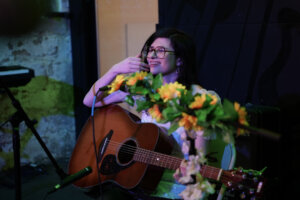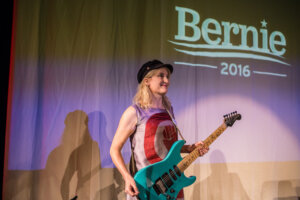Jill Sobule performing at City Winery, 2018. Photo by Getty Images
It was 2017 and I was blasting Attic in my friend Veronica’s dorm room. “Do you want to hear a great Anne Frank song?” I asked her.
She rolled her eyes. “You and your World War II crap” she muttered.
On May 1 of this year, I texted Veronica again. “The Attic lady died,” I said.
“Who?” Veronica wrote back.
The Attic lady was Queer Jewish icon Jill Sobule. I first heard her music in 2013 when I was a high school sophomore binging Dawson’s Creek, enamored with its soundtrack. Sobule’s song “Somewhere in New Mexico” shattered something in me. I was grieving a close family friend who had died of cancer. With every church vigil, she had grown weaker and I was struggling with my Judaism, which I had always viewed as intrinsically bound to my belief in God, a belief now crumbling. Incapable of communicating the isolation of my worldview that was plunging into freefall, I found companionship in “Somewhere in New Mexico.”
In the track, the loneliness of atheism was on full display. The song begins with Jill mocking her friend for believing she saw Jesus only to admit she is probably worse off for her cynicism than her friend is for her blind faith. She glares at a young couple holding hands while a former partner reminds her she never had faith in anything, even love. She begs for statues of the Virgin Mary to cry, she begs for alien abduction, she begs for a miracle. She never gets it. I’d never heard someone discuss the hard parts of losing faith with the honesty and irreverence that Jill did. “She’s a genius,” I thought.
Since I was 5, I’d tried to write songs, but struggled to find my own voice. I felt scared to speak, even though I was screaming inside. My horrible anxiety bred a perpetual dissonance between what I wanted to say, and what I was able to, but Jill’s work empowered me to start writing music about this experience. The result, “Stop, You’re Overthinking It,” was long and somber, but it was also the first original song I performed live and the first song I was ever proud of. Being a human is messy, and when it comes to art, most of what I had been exposed to sanitized the experience of feeling. My music had been confined to aping what I thought people wanted to hear, and seeing nothing of myself in the final product.
Jill didn’t just say the quiet part out loud, she bellowed it, over and over and over again. She wasn’t afraid to put a Holocaust joke in a satirical song about suicidal ideation. With “I Kissed a Girl” in 1995, she became the first artist to have an openly queer song break the Billboard Top 20. She wrote about how mood stabilizers obliterated sex drives. She was funny and unapologetic. She was also hauntingly sincere and created the most human art I had ever encountered. In the weirdness between all the things we’re supposed to feel and the things we actually do, I saw a reflection of my own emotions in music for the first time. I started writing honestly, going for the weird or clichéd line without fear of judgment. I learned to take up space, to advocate for myself, to be honest about what I wanted and what I deserved in the real, non-singing world.
‘These are the moments that stick with you’

In 2015, I sent Jill a Facebook message: “Hey can I cover ‘Somewhere In New Mexico’, it means the world to me.” She replied a few weeks later: Sure! Please send me the cover when you’re done!” and apologized for the delay. I thought, “maybe this could be the start of a mentorship!” Feeling giddy, I mentioned I had a show coming up and asked if she’d like to attend. She left me on read. Mortified, I hit refresh for weeks. It became my own private Idaho of parasocial shame.
Every time I listened to her, I panicked at the prospect of having embarrassed myself. I felt terrified of going to her concerts or engaging too closely. As I watched her open for Bernie Sanders and streamed her TED Talk with Al Gore, I wished I had kept this door closed.
I kept writing, though. I learned guitar, performed around the city, and released music. With every chord I played and line I wrote, I started becoming a little bit more myself. Whenever anyone asked who inspired my music, I would say “oh Billy Joel, Taylor Swift, Jill Sobule…”
In the middle of the global pandemic, I moved to Austria. I’d kept following Jill’s work, the release of her 2018 album, Nostalgia Kills, nearby touring dates, and when I saw an email subject line that said “Zoom Songwriting Classes with Jill,” I opened up my wallet and paid for the course, expecting a complimentary heart attack. “She’s my biggest inspiration and I can’t just not do it, right?” I asked myself.
The class began at 2:30 a.m. Austria time. “I’m Rebecca,” I said when Jill asked us to introduce ourselves. “It’s 2:30 in the morning now so I’m sorry if I’m whispering but I don’t want to get evicted.”
Jill played “Strawberry Gloss” about being a preteen and realizing she had a crush on a female friend. The assignment she gave us for the next class was to write about an unrequited middle school crush.
I felt uneasy. My long-bubbling shame had morphed into something more terrifying — the fear that now that I had her attention and was in her orbit, I was going to blow it.
Still, I let myself remember eighth grade. I’d met a girl and we’d become fast friends. She was cooler than me, aloof and gorgeous. She’d keep me up until the early hours of the morning, telling me I was the only person who understood her. Even so, she ignored me during school and never invited me to hang out with her friends. She called me obsessive, said everyone made fun of me behind my back, that I needed to disappear. I spent years wondering why she had hurt me so badly, and I realized the answer: I had feelings for her. She had broken my heart. It was a wound I had never shared with anyone outside of my notes app. The lyrics of “Strawberry Gloss” orbited around my brain:
It was a terrible time, and no one explained
Everyone suffers, and let me just say
Some had it worse and some feel a loss
Here I am waiting for you
In strawberry gloss.
In the next class, I volunteered to go first. “Um, this song,” I said, “I wrote it a while back but I finished it this week and it’s kinda about like a high school crush but I guess it started in middle school and I don’t know, I’m going to play it now.” Then I did.
When I was done, Jill was the first one to speak. “Rebecca, that was incredible. Beautiful work, beautiful, beautiful work,” she said.
“I felt strange about how much of a hold this relationship had on me for so long, like I was just a kid and nothing happened, but I don’t know — it hurt, I guess,” I muttered, uncomfortable with the praise, not sure if I believed it.
“Hey, Rebecca,” she said. “Listen, I’m pushing 60 and most of the things I write about are stuff like middle school crushes. Those are the moments that stick with you, that make you. It’s also the type of thing that sticks with other people and you should be so proud of the work you made today.”
For the first time, I felt comfortable around Jill. I had cast this nice lady as the face of my insecurities because of a Facebook message from 5 years earlier. I started laughing.
“It is funny, right Rebecca?” Jill said. “The things that stick with us?”
I nodded.
She stopped being a goddess and started becoming Jill
I followed every prompt she gave. I asked her about the songs she’d written, the ones that soundtracked my life, and she addressed every question I had with patience, humor and kindness. “‘Somewhere in New Mexico’ is my favorite song,” I said a few weeks later.
“Always liked that one,” Jill mused. “Y’know, it makes me think about QAnon.”
I stared at her. “Really?”
Jill chuckled. “Yeah, they’re freaks but they’re freaks who believe in something, and it sounds stupid, but part of me is envious of them.”

Her openness triggered an openness in my own songwriting. A prompt Jill gave about unrequited love became the first song I ever wrote about my father’s Parkinson’s — how watching my mother care for him altered my perceptions of what love should be. I started writing about my family, my trust issues, my fear of failure. In the weirdness between all the things I’m supposed to feel and the things I actually do, I gave myself permission to exist for the first time, in all my messiness, in all my creativity, in all my humanity.
One class, the theme was “Flintstones.” It seemed stupid at first, but Jill was able to make a masterpiece out of anything and I would’ve followed that woman into the sun, so of course I worked my ass off on it. I came in with a forlorn ballad about Wilma Flintstone realizing she’s sentient and trapped in a cartoon. In between wistful lyrics about Lillith and Pepsi, I sang the saddest “yabba dabba doo” for the bridge.
Jill lost it.
“REBECCAAAAAA!” she screamed. “Honestly, genius. I’m not just saying that. And that bridge, it’s genius, so so so so f-ing stupid, but genius.”
By now, she had become a peer and a mentor. She would space out and forget things, hesitate before playing new pieces for us. I couldn’t believe someone like her still experienced anxiety. She was a trailblazer, but undoubtedly human. As I watched her make jokes about her upcoming brain surgery, I stopped seeing her as a goddess, I just saw her as Jill.
Right before the last session, I wrote Jill an email. My stomach clenched a little bit, remembering what happened last time I sent her a message when I felt vulnerable. “It’s different now,” I reminded myself. “She knows you, Rebecca. She sees you, she’s proud of you.”
I wrote about how much her music had always meant to me, how it had allowed me to find myself, to appreciate what made my music different, rather than bully myself over the fact it didn’t mesh with what everyone else made. I wrote that I was nervous as anything to study with her but so glad that I had, that it was wonderful, and I was so thankful that she had given me this space and helped me to figure out who I am.
I pressed send.
Jill replied five days later;
“Rebecca, Your letter is beautiful and means so much to me.
It was such a pleasure and honor having you in the class.
I hope you can make the next classes too.
Your presence would be so so welcome.
Xo, Jill”
For years, I continued studying with Jill and updated her on what I was working on. We only met in person once, at a show at City Winery on July 15th, 2021. When she saw me, she ran up and hugged me. “My genius!” she exclaimed. She wrote the same thing on my t-shirt. Someone took a picture of us together, but I was never able to figure out who it was and I was never able to actually get it. “Please let me know if you’re playing a show anytime soon, I’d love to come if I’m in town,” she’d tell me. But we kept just missing each other.
Who the attic lady was
I learned she died from a Stereogum Instagram post. I searched “Jill Sobule House Fire” again and again hoping for a retraction. Needing a retraction.
I looked at the text my friend Veronica had sent me after I told her the “Attic Lady” had died.
“Who?” she had asked.
Who?
I watched the text bubble on my phone triple in size while my memories of Jill burst out of me and onto the keyboard.
Who?

The Attic lady was my friend Jill who wrote the music for the Nickelodeon show Unfabulous and soundtracked the makeover scene in Clueless; who was one of the first people to make a record that was entirely crowdfunded, reinventing the DIY album model; who was an activist, critiquing the politics of the Christian far right with brilliance in 1997; who celebrated the intersection between Judaism and queerness; who created a staging of Yentl as a transgender story. She was a Drama Desk nominee and a born entertainer. She was a neurotic queer Jewish woman who celebrated every ounce of who she was. The world is a sadder place for losing her, but a better place for having had her.
As I sat there crushed, I did what I’d always done when I felt low, I put on Jill’s music. And I laughed. I laughed at her asking a non-Jewish lover “would you have hidden me in your attic?” I laughed at her complaining that she hates when people in entertainment call it “the industry” and whenever she hears that, she responds, “Oh are you in steel?” I laughed while she remarked “Dylan was so mean to Donovan in that movie.” I’d forgotten how much joy she spread in her work and reflected on how blessed I am that she left so much of that joy in the world even though she’s no longer around to celebrate it with us.
Jill was my champion, she was and still is everything I hope I can be in this world: bright and caring and strong and passionate. I can’t believe I almost let myself miss out on forming a connection with her because of a Facebook message. I’m so glad that I didn’t. I love you Jill. Thank you for everything. You’ll always be my genius.
Of late, one of her lyrics I have been returning to is “we have to keep moving or die.” I will, Jill — I promise you.
